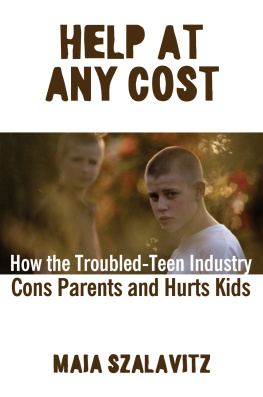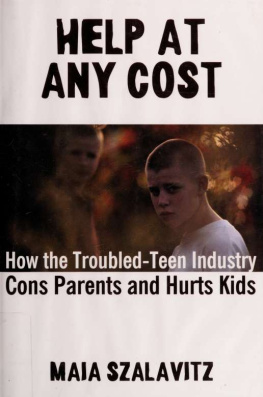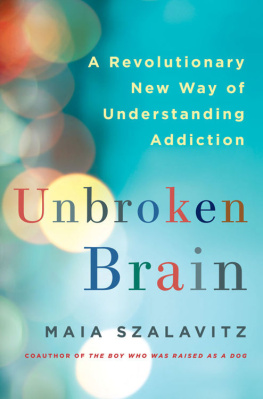
U.S.A. $25.95
Canada $36.00
Maia Szalavitzs Help at Any Cost is the first book-length investigation to tackle the troubled-teen industry, which has existed in one form or another for decades. The tough love treatment programs, boot camps, and wilderness programs that make up this billion-dollar industry claim to cure teens addictions and reform their rebellious behavior. They have their roots in the cult-like sixties rehabilitation program Synanon and seventies Large Group Awareness Trainings such as est, and were fueled by scientific proof that its programs worknor is such proof required. And she illustrates a disturbing pattern of sadistic abuse and preventable deaths in boot camps and wilderness programs.
Weaving riveting personal stories with clear-eyed journalistic analysis, Szalavitz presents an urgent and compelling report that will change the way we look at rebellious teens and the people to whom we entrust them. It promises to draw much-needed attention to a vital issue that has long been overlookedwhile offering proven alternatives for adolescents in turmoil.
Help at Any Cost
RIVERHEAD BOOKS
Published by the Penguin Group
Penguin Group (USA) Inc., 375 Hudson Street, New York, New York 10014, USA
Penguin Group (Canada), 90 Eglinton Avenue East, Suite 700, Ontario M4P 2Y3,
Canada (a division of Pearson Penguin Canada Inc.) * Penguin Books Ltd, 80 Strand,
London WC2R 0RL, England s Penguin Ireland, 25 St Stephens Green, Dublin 2,
Ireland (a division of Penguin Books Ltd) Penguin Group (Australia), 250 Camberwell Road,
Camberwell, Victoria 3124, Australia (a division of Pearson Australia Group Pty Ltd) *
Penguin Books India Pvt Ltd, 11 Community Centre, Panchsheel Park,
New Delhi-110 017, India Penguin Group (NZ), Cnr Airborne and Rosedale Roads,
Albany, Auckland 1310, New Zealand (a division of Pearson New Zealand Ltd)
Penguin Books (South Africa) (Pty) Ltd, 24 Sturdee Avenue, Rosebank,
Johannesburg 2196, South Africa
Penguin Books Ltd, Registered Offices: 80 Strand, London WC2R 0RL, England
Copyright 2006 by Maia Szalavitz
All rights reserved. No part of this book may be reproduced, scanned, or distributed
in any printed or electronic form without permission. Please do not participate
in or encourage piracy of copyrighted materials in violation of the
authors rights. Purchase only authorized editions.
Published simultaneously in Canada
Library of Congress Cataloging-in-Publication Data
Szalavitz, Maia.
Help at any cost: how the troubled-teen industry cons parents and hurts kids / Maia Szalavitz.
p. cm.
Includes bibliographical references.
ISBN 1-59448-910-6
1. YouthServices forUnited States. 2. Behavior modificationUnited States.
3. Juvenile detention homesUnited States. I. Title.
HV1431.S97 2006 2005044957
362.74'8'0830973dc22
Printed in the United States of America
13579 10 8642
BOOK DESIGN BY AMANDA DEWEY
Some names and identifying characteristics of individuals have been changed;
an asterisk at first mention indicates that a persons actual name is not used.
While the author has made every effort to provide accurate telephone numbers and Internet addresses at the time of publication, neither the publisher nor the author assumes any responsibility for errors, or for changes that occur after publication. Further, the publisher does not have any control over and does not assume any responsibility for author or third-party websites or their content.
For my father, Miklos Szalavitz, whom I miss terribly, and
for troubled teens, who need to be heard, not harmed
What we do to our children,
they will do to society.
PLINY THE ELDER
Introduction
A DOLESCENCE STRIKES FEAR in the hearts of even the best parents and raising a teenager, even in ideal circumstances, involves many conflicts and constant worry. But what should you do if your son becomes so out-of-control, so defiant, so irresponsible and impulsive that you know hes not just a typical rebellious teen? What can you do if your daughter refuses to just say no, runs away, risks pregnancy? Where should you turn when the archetypal troubled teen is your child?
Over the last four decades, a multibillion-dollar industry has arisen that claims to answer these questions and promises peace to parents who send their children to residential facilities for tough love. These behavior modification programs offer hope to parents who have become desperate, who feel the need for drastic solutions, who have lost faith in the mental health system and perhaps in their own ability to provide effective discipline. For parents whose teens are not yet in deep trouble, the programs claim preventive powerswhich amounts to promising an all-purpose answer for any type of adolescent difficulty from depression or minor drug use to out-of-control aggression and defiance. With draconian discipline, they promise to whip difficult kids into shape.
Andrea Bradbury* [Throughout this book, an asterisk at first mention of a name indicates that the persons real name is not used] was one obvious candidate for a tough love program. Her parents, a Florida postal worker and a school lunchroom manager, grew increasingly frustrated by their adopted daughters mood swings and disobedient behavior, which intensified during her teen years. Her apparent promiscuity was troublingespecially when she began running away from home to be with her various boyfriends. The Bradburys spent many late nights waiting for word about her whereabouts, desperately wanting the phone to ring but also frightened about what news it might bring. They suspected, too, that Andreas problems were negatively affecting her younger brother, Richard. Andrea just wouldnt follow the rules, wouldnt listen, and wouldnt respond to discipline. Why wasnt their daughter getting the message? What would it take to get through to her?
Bob and Sally Bacon were also deeply concerned about their sixteen-year-old son, Aaron. Bob, an architect, and Sally, who worked various jobs, lived in an upscale neighborhood in Phoenix. Aaron had been a brilliant student and was a popular boy with a sunny personality. But when he hit his sophomore year of high school, his disposition turned darker. His grades sank. He became sullen, taciturn, and dishonest. The Bacons tried family therapy, but nothing seemed to reach him. Bob and Sally had always believed in explaining their values, in talking things out, reasoning everything through. But they worried they had been too soft. Did Aaron need them to put their foot down?
T HE PROBLEM OF DIFFICULT , misbehaving teens is one that affects all kinds of families. No matter how ignorant or educated a parent you are, when its your child at risk, when your beloved baby has grown into someone you desperately want to protect but can no longer understand, you can become vulnerable to someone who offers answers, especially answers that dont imply mental illness, since there is still such tremendous stigma attached to psychiatric disorders. And adding to parents quite understandable reluctance to expose themselves to judgment and shame is the fact that treatments for mental and behavioral problems are underfunded, misunderstood, and underresearched. Consequently, its difficult even to know what type of help to seek, more challenging to find providers who utilize the best practices if you do manage to learn about them, and difficult to afford help if quality treatment can be located.
This is where tough love programs come in. Their main message is this: Todays teens are so out-of-control and so morally compromised that only extremely harsh, perhaps even brutal tactics can keep them in line. A bit of cruelty is necessary, even kindsignifying good parenting, the opposite of abuse. Whether you have been a lenient parent or a strict one doesnt matter, its not your fault: even the best parenting can be overcome by outside pressures. Awash in Americas cultural morass, parents have become too swamped to discipline effectively. And the answer, according to tough love proponents, is that troubled children need to be removed from this toxic environment, isolated, infantilized, and re-parented, returned only when they are fully prepared to comply with family rules. To prevent backsliding after treatment, parents are instructed on how to lay down and enforce the law, to make family membership itself contingent on total cooperation.
Next page








